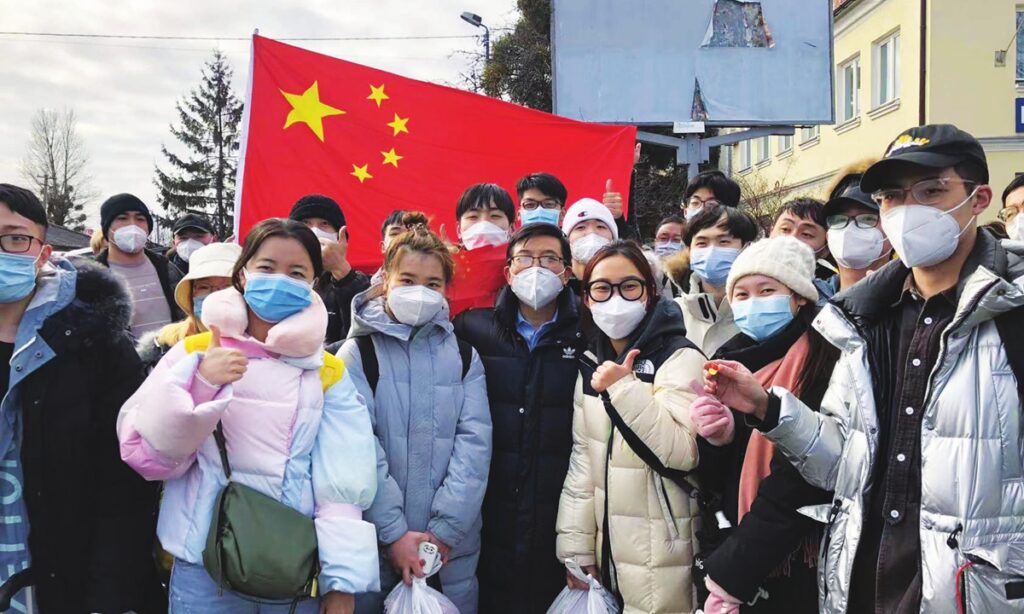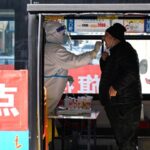Editor’s Note:
Since the escalation of the situation in Ukraine, China’s Ministry of Foreign Affairs quickly activated the consular protection emergency mechanism to ensure the safety of Chinese compatriots in Ukraine and urgently organized, guided and coordinated the evacuation of Chinese citizens in the country.
On the afternoon of March 9, as the last batch of Chinese students evacuated from Sumy, Ukraine arrived at the railway station in Lviv, a city in western Ukraine, Chinese Ambassador to Ukraine Fan Xianrong officially announced that the task of evacuating Chinese compatriots from Ukraine was completed.
In an exclusive video interview with the Global Times (GT) reporters Zhao Si’an and Xing Xiaojing, Ambassador Fan (Fan) disclosed for the first time that the embassy’s evacuation was executed under “the most complicated environment and the most dangerous situation.”
“We are racing against time and to save lives. We are not sleepless just tonight, but sleepless every night,” he said.

Students evacuated from eastern Ukraine’s Sumy city pose with the Chinese Ambassador to Ukraine Fan Xianrong (center) for a photo in Lviv, Ukraine on March 9, 2022. Photo: Courtesy of the Chinese Embassy in Ukraine
GT: What was your feeling when you made the statement in Lviv train station? How did you feel at that time?
Fan: Looking back on it now, I still feel overwhelmed. At that time I had mixed feelings, as I was very happy to see the safe arrival of our students, while at the same time knowing how hard it was for them to evacuate all the way from Sumy, experiencing all kinds of dangers or even threats to life.
In Sumy, many Chinese students were trapped in between the crossfire and military blockades. They could not get out even if they could find a bus. We had an arduous process of negotiation with local authorities to finally arrange their trip, but our hearts were clenched the entire time during their 30-hour evacuation as there were many unpredictable risks along the way.
The successful evacuation of Sumy-based students also marked the successful conclusion of the entire evacuation operation of more than 6,000 Chinese nationals in Ukraine, which was indescribably difficult. As the oldest member in our embassy, I had not seen a real war before.
Given the fast-changing situation, our decisions needed to be quick and accurate, and did not allow for a single mistake. I always say that we are racing against time, and racing to save lives. It was not just one single day of sleeplessness for us, it was “sleepless every night.”
That’s why at the Lviv station, all our embassy staff and the students cried out “Long live China, long live the Chinese people, and long live the Communist Party of China!”
GT: How did the overall plan for evacuating Chinese citizens come about? How many evacuation routes were arranged? How many resources were mobilized? Can you give us an overview?
Fan: Of the 6,000 Chinese nationals in Ukraine, the embassy coordinated the evacuation of more than 5,000 people. Under such tense environments in Ukraine, all of them are safe and sound except for one who got injured. Bullets have no eyes, but our arrangements and the love and unity among our compatriots safeguarded the evacuation.
Regarding the evacuation routes, we gave it a lot of thought. For example, we thought about whether to adopt the original plan which was to charter flights. There was no problem for China to arrange them but the security situation in Ukraine did not allow us to do that. We also considered evacuation by sea to gather all Chinese to Odessa, but the urgent need for ships made the plan unviable. Finally, we were left with one route, that is by road, from east to west and then to neighboring countries.
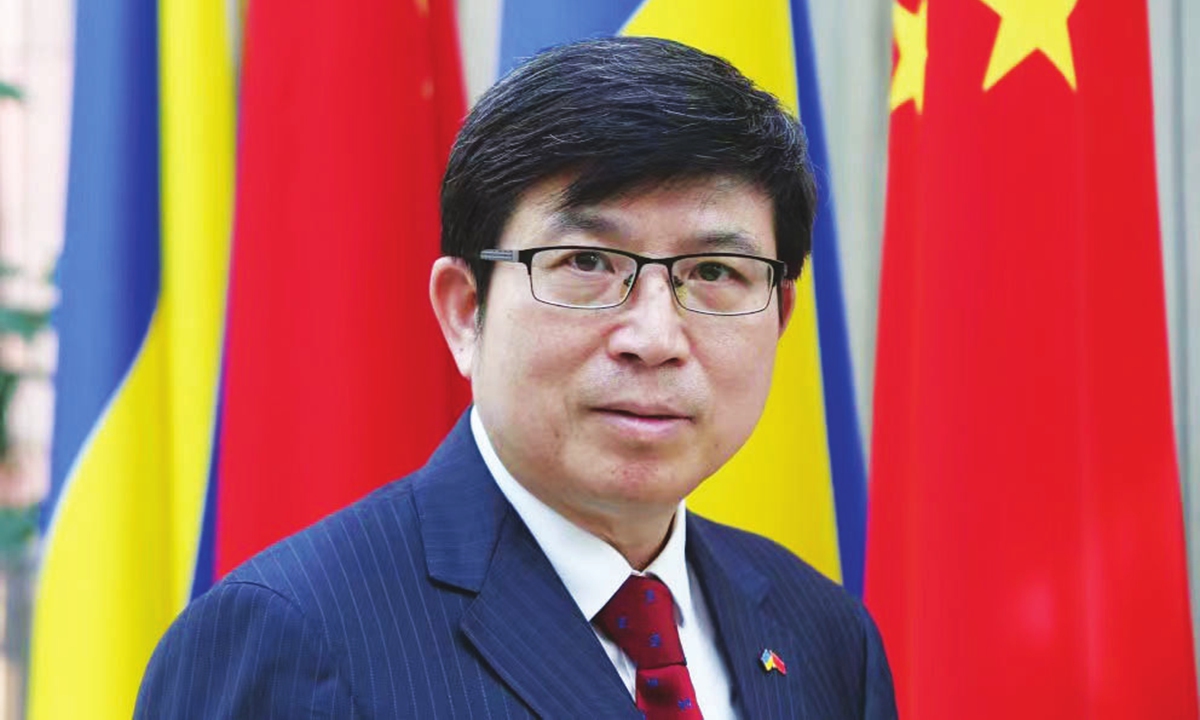
Chinese Ambassador to Ukraine Fan Xianrong. Photo: Courtesy of Chinese Embassy in Ukraine
GT: What were some of the “most complex” challenges during this evacuation process? What valuable lessons have we learned?
Fan: During the just concluded evacuation, we experienced the most complex and dangerous environment and the most difficult operation. It involved the most worrisome group, and had the most embassies and consulates coordinating in the joint efforts.
Compared to previous evacuation operations, this time it was organized amid a large-scale military campaign. Nearly half of all the 6,000 Chinese citizens in Ukraine were students. They are not old enough for the situation, and their families were not around.
We coordinated with 10 of our embassies and consulates in neighboring countries. Under joint efforts by the central government and the Foreign Ministry, we sent back one person after another in a relay, which is a reflection of the strength of our country.
What enlightened us for the future is that the instructions of the central government and the strong deployment capabilities of the Foreign Ministry are the premise and guarantee for us Chinese embassies to deliver a satisfactory result. Another is that we must have a sense of responsibility to take the initiative. The operation also told us to give full play to the strength of our compatriots in the countries where we are stationed.
GT: Many Chinese citizens drove to Poland, Slovakia, Hungary, and other countries bordering Ukraine during the evacuation. What arrangements have the embassy coordinated with these countries to facilitate customs clearance for Chinese nationals?
Fan: Without the assistance of relevant countries, we would not have completed this evacuation mission. First, there was the Ukrainian side, which opened green channels for us, and provided buses and special trains. In one single operation to evacuate students based in Sumy, I liaised with the vice premier of Ukraine more than 300 times. The Russian side also helped ensuring the safe passage of our Chinese citizens.
There was also help from other countries neighboring Ukraine. For example, Moldova, Romania, Slovakia, and Hungary granted Chinese nationals temporary visa-free entry. Some had lost their identity certificates but were also allowed in by only showing digital versions, which is usually “impossible,” and this has shown a friendly attitude toward Chinese nationals.
It showed that without China’s growing influence and good relations with countries concerned, it would have been impossible to perform a “chorus” of cooperation during the operation.
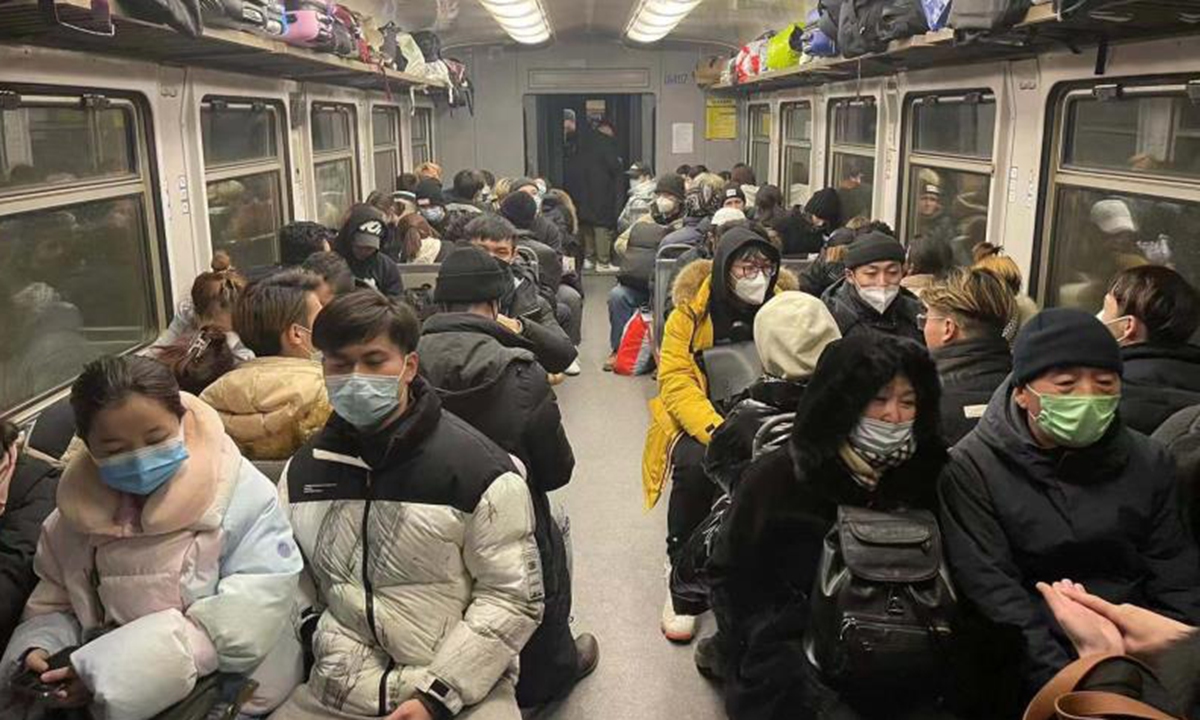
Chinese students on a train to Lviv, western Ukraine on March 9, 2022 Photo: Courtesy of the Chinese Embassy in Ukraine
GT: We learned that while an embassy staffer was escorting 88 students to Moldova via bus, three bombs exploded near the bus in less than an hour. What else did you and your embassy staff encounter?
Fan: The story you mentioned looked like a movie scene but it was a true story, and there was a sequel. When the diplomat was returning from escort, the driver was so tired that the car swerved into a ditch but luckily it did not overturn, otherwise the consequences would have been unthinkable. On another occasion, one of our diplomats was checking out a site when he was suddenly held at gunpoint.
Talking about the moment of “brushes with death,” the streets may have explosions at any time, and every time we escorted the students it was through a shower of bullets… However, the time calls for “heroes in harm’s way.” [Protecting our people] is the responsibility and mission of us diplomats, and we never have any regrets.
GT: In the tense situation, the video of the Chinese national flag waving high at the Chinese Embassy in Ukraine touched many. Scenes of the embassy staff arranging and coordinating the evacuation of Chinese citizens in the basement made people feel safe. How do you live and work in the cramped space in the basement of the embassy?
Fan: The tensions escalated suddenly, and the embassy took the protection of the Chinese citizens in Ukraine as its top priority, wanting to evacuate them to safe places as soon as possible. However, the usual working environment and working order was completely disrupted. The alarm went off and the explosions were getting closer and closer, so we had to move to the basement.
The basement is actually a warehouse. The space is small. Everyone had to crowd to work in it. The corridor was also crowded with people. There was a curtain on the door, but it couldn’t stop the cold wind from blowing in, so everyone crowded together to work. When they were sleepy, they just found a place to rest in the back. However, everyone was thinking about how to do their work well, and they didn’t complain about how hard the work was.
The entire embassy staff and family members all participated in the work in solidarity. It is precisely because we have a team with strong political consciousness and excellent capability, especially being able to endure hardships, that ensured the successful completion of this evacuation work.
GT: Do you have any impressive stories to share during the evacuation process?
Fan: There is a young diplomat in our embassy, born in 1997. From 5am in the early morning of February 24 when the first bomb exploded, he started to answer the consular phone which has not stopped for a moment ever since. The phone ran out of battery and was charged the whole time and it was burning hot. From 5am to 10 pm, he did not stop for a minute, his voice had been hoarse from speaking that entire time. He took about 1,000 calls that day. The young diplomat is the same age as those who just graduated from college but he already possesses such dedication and understanding of his mission as a diplomat – the work is hard on one hand but honorable on the other.
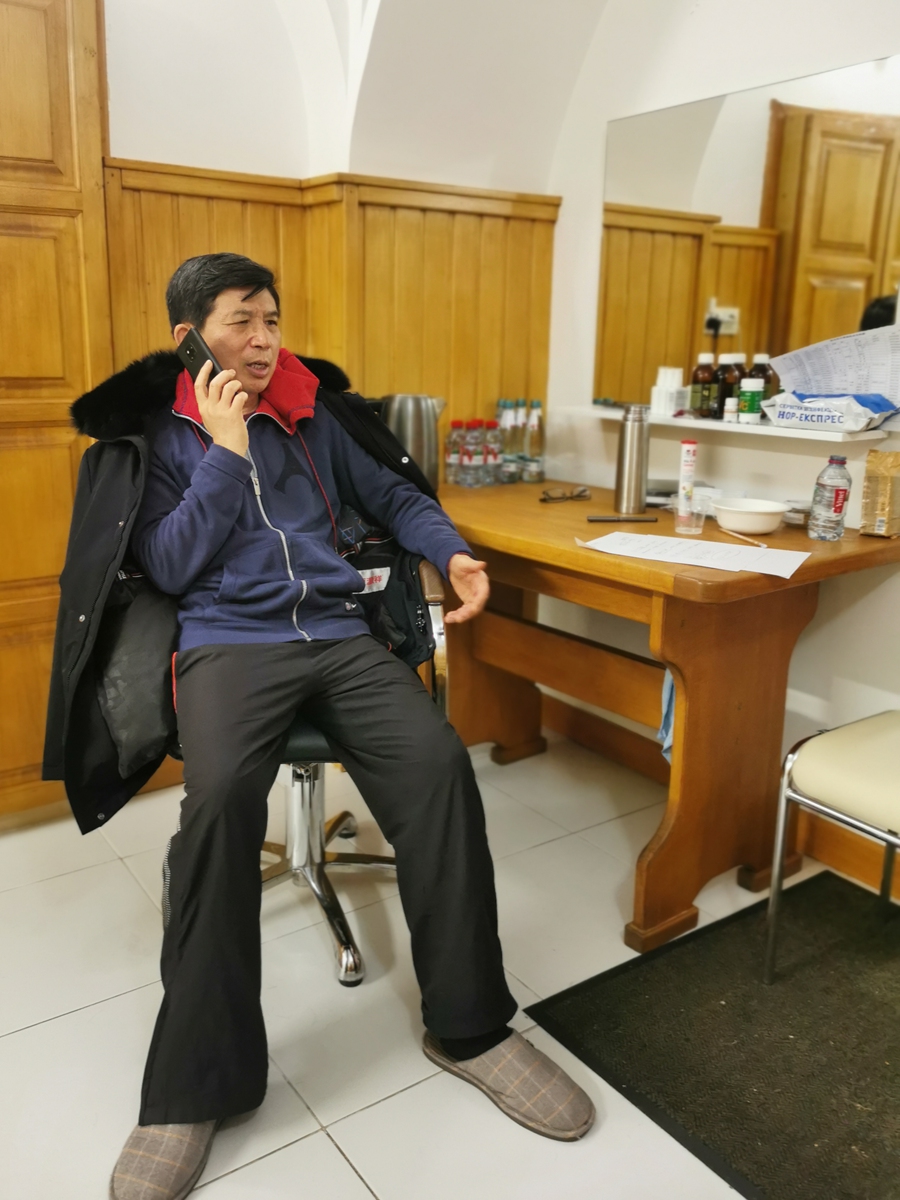
Chinese Ambassador to Ukraine Fan Xianrong works in the embassy’s basement during the Ukraine-Russia conflict. Photo: Courtesy of Chinese Embassy in Ukraine
Another point I would like to make is that without the help and warmth of our fellow compatriots, the evacuation would not have been such a success. For instance, Chinese citizens with cars took the initiative to find those who don’t and took them along to evacuate. When there was a loaf of bread, they would share half of it with their compatriots. When they arrive at their destinations, there would be local student unions, associations, and chambers of commerce helping them settle in. It is such simple stories that merge into one big story of the successful evacuation of all our fellow citizens.
GT: On the day when Russia-Ukraine conflicts broke out, what were you and your colleagues doing?
Fan: News about the Ukraine situation has been in circulation since the end of 2021 but the public has remained calm and orderly, and Chinese citizens had been working, studying, and living normally. At around 5am local time on February 24, a huge explosion sound pierced the quiet night sky and separated us from normal life. We were all awoken and suddenly entered a “state of war.” The sudden change took us by surprise but soon we calmed down and began to think about our next step to cope with the situation.
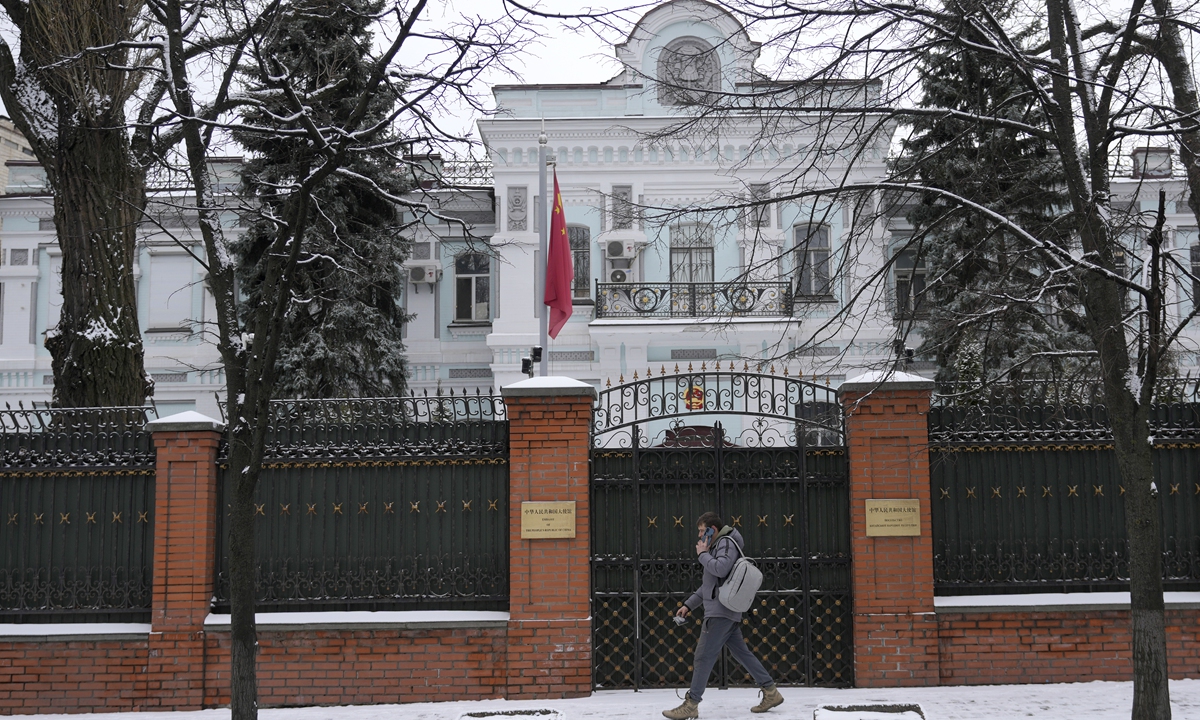
Chinese Embassy in Ukraine on March 1 Photo: VCG
GT: As the Ambassador, you released a letter to all Chinese compatriots in Ukraine on February 27. Could you provide the background of the letter and the feedback you received after it was released?
Fan: The sudden change of the situation in Ukraine was unexpected. If you don’t understand the situation, it is likely to lead to panic and may cause emotional problems. Moreover, the false rumor that “Ambassador Fan has escaped” had made the compatriots who did not know the truth to panic even more, and the situation would have been very dangerous if people just evacuated blindly.
After comprehensive consideration, the embassy believed that it was necessary to clarify the false rumors, so as to appease the emotions and boost confidence among the compatriots. It was to tell them that the embassy was by their side and the motherland was behind them. Considering that there were still many Chinese students in Ukraine, the embassy needed to also remind them of the precautions to take in a crisis situation.
The original plan was to write only one letter. But in order to let everyone see the current status of the ambassador, and to make everyone feel like they were talking to the ambassador, we finally chose to release a video and text at the same time, to tell compatriots that the members of the Communist Party of China and the Chinese ambassador would never abandon the people and would never flee.
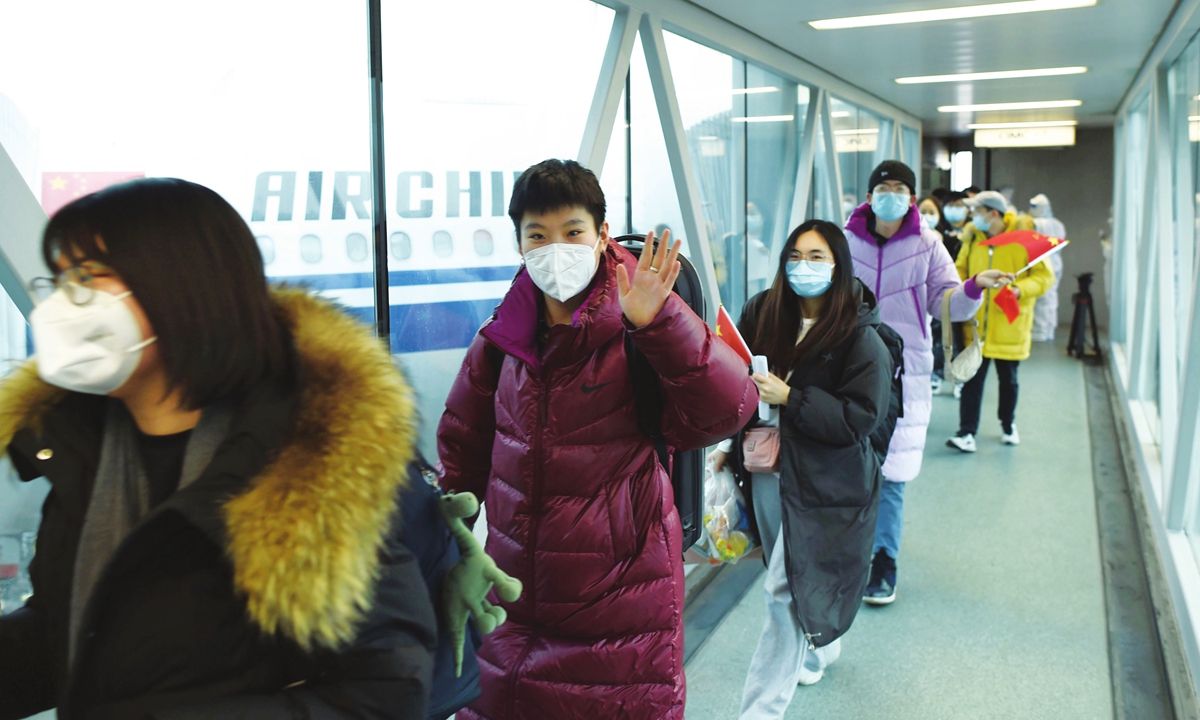
Evacuated Chinese citizens arrive at Hangzhou, East China’s Zhejiang Province on March 5, 2022. Photo: Xinhua
GT: Diplomats are also parents and children in their own families, and the safety of embassy staff also worries the hearts of their families. How did you and the embassy staff console your families?
Fan: We have multiple identities: We are diplomats for our country but also members of our families. We don’t want to make our families worry too much, but as the old saying goes, “Loyalty and filial piety cannot be met at the same time,” and we gave our priority to fulfilling diplomatic mission.
My father, an 80-year-old who lives in Chongqing and is not so highly educated, got very anxious when he saw the news on TV. I could only tell him that it’s safe here to ease his mind. But the reality is that air-raid sirens are still sounded every night at 3 or 4 am, waking us up every night and we have to take shelter immediately.
We try to protect ourselves while performing our duties, wearing bulletproof undershirts and helmets. The concerns at home actually give us a sort of spiritual support and strength.
GT: Could you please tell us about the embassy’s next priorities and arrangements?
Fan: Although the evacuation of Chinese citizens in Ukraine has been completed successfully, our mission as diplomats is not over. We will continue to perform our duties in Ukraine and do our best to handle relevant matters.
Students evacuated from eastern Ukraine’s Sumy city pose with the Chinese Ambassador to Ukraine Fan Xianrong (center) for a photo in Lviv, Ukraine on March 9, 2022. Photo: Courtesy of the Chinese Embassy in Ukraine

